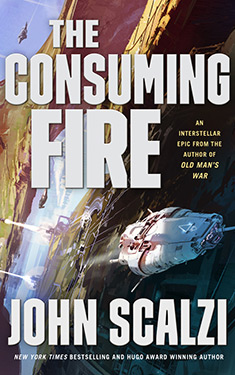John Scalzi
Completed 8/8/2021, Reviewed 8/8/2021
4 stars
I was surprised I enjoyed this second in the Interdependency trilogy. It had a lot more exposition and was more space opera-ish than The Collapsing Empire, two things that usually bother me. It had a lot of court intrigue which at first, I found off-putting, but I was quickly sucked into it and actually enjoyed it. The exposition I actually didn’t mind because Scalzi recounted his world building with it, and since it’s been three years since I read Empire, it was quite welcome. I did find it a little less impressive than the first book, as is often the case in the second book of a trilogy, but overall, I’d say Scalzi hit another home run with this installment.
The Flow is continuing to collapse, but there are people in high places who either don’t believe it or want to use it for political gain. Cardenia, the Emperox, has announced that she has had visions, like the first Emperox did, making the need to deal with the collapse a religious issue as much as socio-political issue. There are rumors that she is going to declare martial law and basically destroy the power and fortunes of the various ruling houses. One house in particular begins devising a coup, after unsuccessfully trying to assassinate Cardenia in the previous book. In the meantime, Marce, the scientist who told the Cardenia about the Flow’s collapse, finds a fellow scientist who has discovered that Flow might be actually try to rebuild itself in a process she calls evanescence. Of course, it will take a long time for this to happen, requiring the Cardenia do something to protect her people in the meantime from the collapsing Flow and the political chaos that also seems imminent.
Yeah, I had a tough time coming up with a plot summary, as you can probably tell from the previous paragraph. It’s because the book is almost all political intrigue, something I have a tough time wrapping my head around. There are so many threads to it that it’s very easy to get confused by. There are a lot of characters and I initially had a tough time keeping them straight in my head. Fortunately, after about a third of the way through the book, I was gripped by the intrigue and was able to follow it better. It helped that a few of the characters I couldn’t keep track of got knocked off in the course of the book.
What also helped me was that the main characters in this book are the same as in Empire. Cardenia, Marce, and Kiva. Kiva now manages the accounts of the house that tried to assassinate Cardenia, and she uncovers a whole lot of corruption, information that the Emperox can use to her advantage. Kiva is still brash and over the top and she’s literally sleeping with the enemy’s lawyer. Once again, she’s fun and adds a lot of humor to the book.
The book is told mostly from four third-person points of view this time, those of the three main characters and a fourth, omniscient narrator. That’s where most of the exposition comes in. It goes through a lot of history of the empire and background of secondary characters. As I said above, I didn’t mind it because it filled in a lot of memory gaps.
I give this book four stars out of five. It wasn’t quite as good as its predecessor, but it’s not simply a three-star book either. It’s an intense political space opera that takes a while to become fun to read. But I assure you, it does become fun and the end has quite a zinger. Being this is a trilogy, there’s one more book to go, so there are still some plot points hanging. I will read it, probably after a different book just to cleanse my palate a bit.

No comments:
Post a Comment